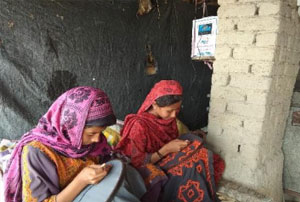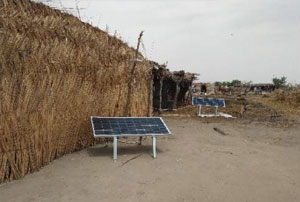Hey kids! See what I have brought for you today”, shouts Sadique as he enters his house. His young daughters – Fatima and Heer – run towards him with curiosity in their eyes. He gives them a small bag full of their favorite fruit grapes saying, “This is fruit of your hard work”. The girls are overjoyed on getting delicious grapes which they have been looking forward to for a long time but could not afford due to limited earnings. There were many other things the girls longed for, but could not afford to buy them.
On that particular day, Sadique could bring some grapes because he had made a little extra money by selling the embroidery work Fatima and Heer had made by working overnight. Sadique, himself, worked on a farm and earned a meagre wage. The embroidery work by his daughters helped him earn a few extra rupees. However, it was still difficult for the family to make ends meet, let alone afford the luxury of eating fruits.

Heer and Fatima used to do embroidery during the daytime since the intricate work required a well-lit place but their village Goth Wazir Khan, District Sohbatpur, Balochistan had no electricity to light up their house after sunset. Working under kerosene lamps was no option as it would affect their eyes and breathing. The shortened winter days would further reduce their output.
The local electricity supply company had no plans to connect the remote Goth Wazir Khan with the main electricity grid in the near future. WDCO’s intervention to install solar power systems in the area with the support of AFGP created a buzz in the area and helped increase the livelihood opportunities locally. Sadique also benefited from their intervention.
With the solar-powered bulbs lighting up their room, Fatima and Heer are able to increase their daily yield of embroidery work. They are able to produce more pieces, which their father sells in the local market and helps them earn extra money. “My daughters’ work is in high demand in the market and additional pieces let us earn enough money to afford the luxury of fruits,” says Sadique proudly. “The monthly yield has increased from 15 to 25 units with the installation of the solar system,” he added.

WDCO has installed 130 solar systems in many households in six villages of district Sohbatpur. This intervention improved living standards of 1,284 individuals (including 655 women/girls and 629 men/boys) of the area. They are hopeful that this intervention will serve as a catalyst in the upward economic mobility of one of the most deprived communities in the country.




















